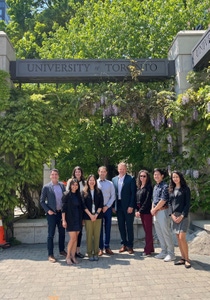Media
BASF signs its first Canadian Master Research Agreement with the University of Toronto
-
BASF’s milestone partnership unlocks new opportunities and simplifies collaboration between BASF researchers across the globe and those at the University of Toronto.
-
The partnership will drive innovation in key areas, with five new projects underway, including research on lasso peptide and fungicide synergies for seed treatments and machine learning for solubility prediction
MISSISSAUGA, ONTARIO, APRIL 14, 2025 – BASF and the University of Toronto have signed a Master Research Agreement (MRA) to streamline innovation projects and increase collaboration between BASF and Canadian researchers. This partnership is part of a regional strategy to extend BASF's collaboration with universities in North America into Canada. This is a great achievement for BASF, as it marks the company's first MRA with a Canadian university.
By partnering with the University of Toronto, which has received world-class recognition for leveraging the power of Artificial Intelligence and machine learning to advance technologies, BASF will gain access to the University's cutting-edge research and innovations, as well as increased flexibility regarding intellectual property (IP) ownership, significant cost savings through government matching funds and tax incentives. BASF will also gain access to a larger talent pool and greater visibility within the Canadian research community.
"BASF continually seeks opportunities for collaboration that drive innovation and digitalization," said Benjamin Knudsen, Vice President of Research North America at BASF Corporation. "This partnership exemplifies BASF's Winning Ways strategy, especially our commitment to accelerating innovation through a robust R&D ecosystem that complements our research capabilities. We look forward to the advancements we will achieve together and to strengthening our research community, creating a meaningful impact throughout the region."
Since signing the agreement, BASF and the University of Toronto have launched five projects demonstrating the partners' commitment to advancing sustainability and innovation in agriculture and chemistry.
“The University of Toronto has placed a big bet on innovation in the materials domain through our Acceleration Consortium, combining advances in robotics and artificial intelligence with subject matter expertise in chemistry, materials science, pharmaceuticals and chemical engineering,” said Professor David Wolfe, Acting Associate Vice-President, International Partnerships at the University of Toronto. “But in order for our research to truly move the needle in this field, we need to work with world leaders who develop, validate and manufacture materials at scale. BASF, as one of the world’s largest and most innovative chemical companies, is better positioned than anyone to inspire and be inspired by the work we do.”
About BASF
BASF Canada, headquartered in Mississauga, is a subsidiary of BASF SE and an affiliate of BASF Corporation in North America. BASF has approximately over 1,100 employees in Canada and had sales of $2.6 billion in 2024. For more information about BASF Canada’s operations, visit www.basf.com/ca.
At BASF, we create chemistry for a sustainable future. Our ambition: We want to be the preferred chemical company to enable our customers’ green transformation. We combine economic success with environmental protection and social responsibility. Around 112,000 employees in the BASF Group contribute to the success of our customers in nearly all sectors and almost every country in the world. Our portfolio comprises, as core businesses, the segments Chemicals, Materials, Industrial Solutions, and Nutrition & Care; our standalone businesses are bundled in the segments Surface Technologies and Agricultural Solutions. BASF generated sales of €65.3 billion in 2024. BASF shares are traded on the stock exchange in Frankfurt (BAS) and as American Depositary Receipts (BASFY) in the United States. Further information at www.basf.com.
